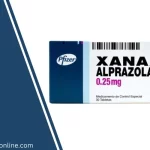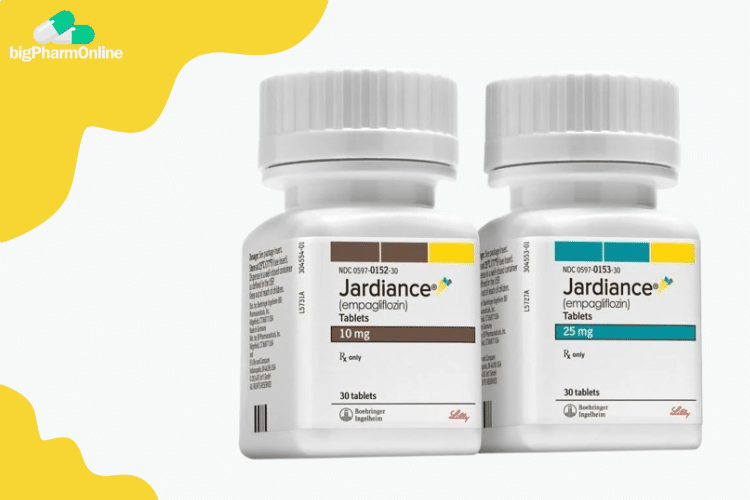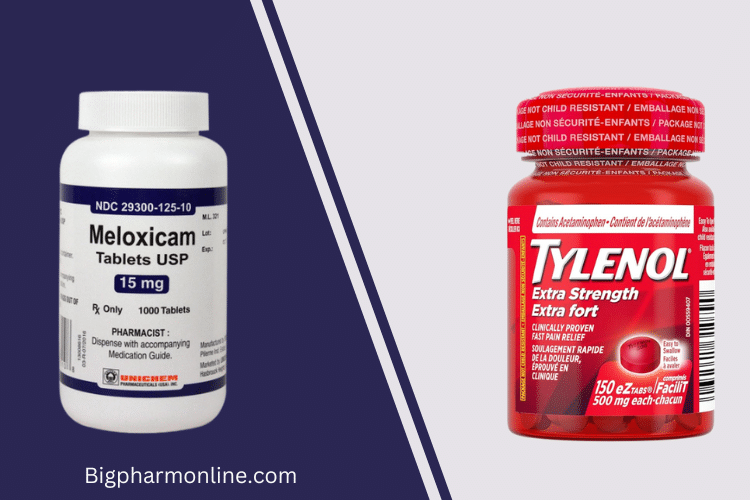Can I Take Ibuprofen with Mucinex DM or Mucinex | Is It Safe?
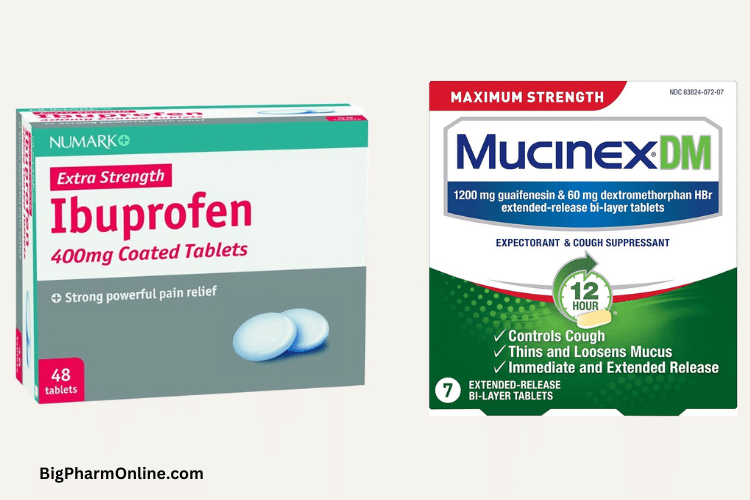
If you are dealing with body pain, fever, or maybe inflammation of some sort, while also battling common cold or flu on the other hand. You might want to take ibuprofen for the pain, inflammation, or fever and also Mucinex DM to alleviate the unbearable symptoms of the common cold or flu.
That’s totally fine! They are both Over-the-counter medications, but you’re conflicted about the safety of both drugs. So, Is it safe to take Ibuprofen with Mucinex DM together? Can you also take Ibuprofen with Mucinex? Let’s see what the pharmacist has to say.
Key points
- It is safe to take both Ibuprofen and Mucinex DM together because there is no documented interaction between the components of either drug.
- Mucinex and Ibuprofen can be safely taken together as there are no known interactions between the two. Both drugs target different symptoms and the action of one does not suppress the effectiveness of the other
- Ibuprofen should be avoided by patients with peptic ulcer disease or a history of such. As well as patients with asthma. This is due to the tendency of this drug to worsen these conditions.
Can I Take Ibuprofen With Mucinex DM?
Yes, you can take Ibuprofen together with Mucinex DM as they contain different active ingredients that do not chemically interact with each other. The two drugs are entirely different products and aim to treat different symptoms or conditions.
They also work differently within the body. So you can rest assured that you won’t have any safety concerns from mixing them, provided you take the appropriate doses of each.
Can You Take Ibuprofen with Mucinex?
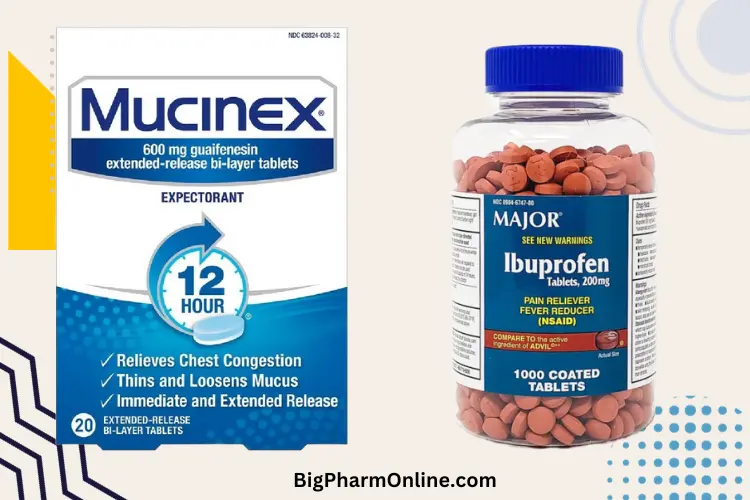
It is safe to take Ibuprofen with Mucinex as there are no known interactions between the two of them. Both drugs contain unique ingredients that target different symptoms or disease conditions.
The action of one drug has not been found to decrease the effectiveness or increase the side effects of the other. Hence, you can safely use Mucinex with Ibuprofen (Advil, Motrin) without any worries.
In fact, a study conducted on mice has shown that combining guaifenesin with Ibuprofen may actually increase the analgesic (pain relieving) effect of Ibuprofen. In the study, it was found that administering Guaifenesin alone did not prevent pain in the mice.
However, upon simultaneous administration with low doses of Ibuprofen, Nimesulide, and Celecoxib (all of which are NSAIDS), a significant analgesic effect was recorded.
Since this study was conducted on mice, there’s still a need to test out and confirm this finding in humans.
Taking Ibuprofen With Other Variants of Mucinex
There are several other variants of Mucinex such as Mucinex 12 Hour, Mucinex Sinus-Max, Mucinex Fast-Max, Mucinex Nightshift Cold & Flu, Mucinex Nightshift sinus and Mucinex Multi-symptom for children.
These formulations contain ingredients that are different from those in Mucinex and Mucinex DM. Let’s see if there is an interaction between them and Ibuprofen
Can You Take Ibuprofen With Mucinex 12 Hour?
Yes, it is safe to take Ibuprofen with Mucinex 12 Hour as long as you do not exceed the maximum dose of Mucinex recommended within 24 hours.
Mucinex 12 Hour is an extended-release formulation of guaifenesin. It is a bi-layer tablet consisting of an immediate-release layer on one side and an extended-release layer on the other side of the tablet.
Can I Take Ibuprofen With Mucinex Fast-Max?
Yes, Ibuprofen and Mucinex Fast-Max can be taken together especially if you need faster and better relief from headaches and fever. This is because, in addition to guaifenesin, Mucinex Fast-Max also contains acetaminophen.
Acetaminophen is a pain killer and a fever reducer. When combined with Ibuprofen, it can provide better relief to pains and fever compared to individual use.
Can You Take Ibuprofen With Mucinex Sinus-Max?
It is safe to take Ibuprofen with Mucinex Sinus-Max because they contain different ingredients that do not interact together. Mucinex Sinus-Max is a maximum-strength formulation for the relief of sinus congestion, chest congestion, headaches, and minor pains.
It usually combines a pain reliever (acetaminophen), an expectorant (guaifenesin), and a nasal decongestant (phenylephrine HCI) at maximum strength.
Can You Take Ibuprofen With Mucinex Nightshift Cold & Flu?
Mucinex Nightshift Cold & Flu can safely be taken with Ibuprofen as there is no interaction between the components of either medication. This variant of Mucinex is specially formulated to provide fast relief to nighttime cold and flu symptoms for better sleep.
It comes in two different types:
- Mucinex Nightshift Cold & Flu and,
- Mucinex Nightshift Severe Cold & Flu
The Mucinex Nightshift Cold & Flu combines Acetaminophen, Dextromethorphan HBr, and Phenylephrine HC at maximum strength. Whereas the Nightshift Severe Cold & Flu contains all the 3 above with an additional ingredient called Triprolidine (an antihistamine)
Can You Take Ibuprofen With Mucinex NightShift Sinus?
There is no interaction between Ibuprofen and Mucinex NightShift Sinus. Hence, they can be safely taken together.
Mucinex NightShift Sinus is formulated to provide quick relief to sinus and nasal congestion that seems to strike at night.
It combines 4 maximum strength ingredients (Acetaminophen, Phenylephrine, Dextromethorphan, and Triprolidine) in one dose.
Can you take Mucinex Multi-Symptom with Ibuprofen?
Yes, it is safe to give Mucinex Multi-symptom for children with Ibuprofen since there is no documented interaction between the active components in the two drug products.
However, you should know that the majority of Multi-symptom products contain acetaminophen, a pain killer.
Since it is for kids, it is generally not advisable to combine analgesics like acetaminophen and Ibuprofen together. Especially when the aim is to provide relief for minor headaches.
About Ibuprofen

Ibuprofen is an over-the-counter medication with the capability to treat inflammation and relieve pain and fever. It belongs to a class of drugs called Non-Steroidal Anti-inflammatory Drugs (NSAIDS). The same class to which diclofenac, aspirin, and naproxen belong.
Ibuprofen is often prescribed to treat mild to moderate body pains. And to also relieve fever and inflammation. It works primarily by blocking an enzyme called cyclooxygenase which is responsible for converting another substance in the body to prostaglandins.
Prostaglandin acts like a hormone in the body. It causes fever by upsetting the thermoregulatory center in the hypothalamus of the brain. It is also believed to be responsible for pain. And of course, not ruling out its role in inflammation.
So, what Ibuprofen does is block the production of prostaglandin. An action it achieves by blocking the enzyme that catalyzes its production. Ibuprofen is available in the market as Advil. Motrin, etc.
About Mucinex DM
Mucinex DM is a cough medication consisting of two active ingredients -guaifenesin and dextromethorphan. It is a variant of Mucinex, the original product containing solely guaifenesin.
Guaifenesin is an expectorant. It helps to clear the airway and also proves efficient in relieving chest congestion. It acts by thinning the mucus in the airways, making it less sticky and hence easier to cough out.
Dextromethorphan is a cough suppressant. It treats cough by suppressing the part of the brain responsible for the reflex. It belongs to a class of drugs called antitussives.
Mucinex DM is designed as an extended-release bilayer tablet. What this means is that it contains an immediate-release layer whereby the active ingredients will be released and absorbed into the blood as soon as that layer has dissolved. And also an extended-release layer that enables the active compounds to be released slowly over an extended period.
Interactions Between Mucinex DM and Ibuprofen
There is no documented evidence that the contents of Mucinex dm (Guaifenesin and Dextromethorphan) interact chemically with Ibuprofen. However, these active ingredients may react with other medications taken concurrently with them.
The dextromethorphan in Mucinex DM can interact with about 331 other medications of which 74 are classified as major, 255 as moderate, and 2 as minor.
The major drugs it can interact with are certain monoamine oxidase(MAO) inhibitors like selegiline, phenelzine, tranylcypromine, isocarboxazid, etc.
Dextromethorphan’s interaction with these drugs is considered clinically significant or even fatal and as such, their combination should be avoided.
To avoid possible interaction, your doctor might recommend that you avoid taking MAO inhibitors for about two weeks before being placed on the dextromethorphan-containing product.
Other drugs it can also interact with include metaloxone, methylene blue, safinamide, and alcohol.
Ibuprofen does not interact with guaifenesin or dextromethorphan but it can do so with the following medications:
- Lithium
- Oral hypoglycemics (e.g., metformin, glyburide)
- Warfarin
- Medications for lowering blood pressure (e.g., amlodipine, losartan)
- Beta-blockers (e.g., metoprolol, propranolol)
- High-dose methotrexate
- Diuretics (e.g., hydrochlorothiazide, furosemide)
- Angiotensin-converting enzyme inhibitors (e.g., lisinopril, enalapril)
Note that this is not an exhaustive list of all the drugs Ibuprofen interacts with.
In a case where you are taking another medication outside Mucinex DM, you should check with your doctor or pharmacist to crosscheck them for you. Our team of pharmacists is also available to answer all your queries.
Side Effects Of Mucinex DM
Mucinex DM usually doesn’t cause any severe side effects when taken at recommended doses. However, you may experience nausea, vomiting, drowsiness, or dizziness.
Severe allergic reactions are rare. If you notice any of these symptoms or they persist longer than they should, reach out to your doctor or pharmacist.
Side Effects Of Ibuprofen
Ibuprofen can cause the following side effects:
- Upset Stomach and Gastric Ulcers due to its ability to irritate the stomach lining and increase stomach acid production.
- Nausea, Vomiting, and Heartburn
- Diarrhea or Constipation
- Headache
- Dizziness
- Rash and Allergic Reactions
- Increased Blood Pressure
- Kidney Problems
- Ringing in the Ears (Tinnitus); Less common but possible side effect.
If you experience any of the listed side effects after taking Ibuprofen, contact your doctor or pharmacist.
Precautions
Ibuprofen is contraindicated (not recommended) in patients with peptic ulcer or a history of peptic ulcer disease. This is because it can worsen the condition. Also, it is advisable to take it with food in order to reduce the risk of gastric irritation associated with it.
Ibuprofen is also not recommended in patients with asthma or who experience difficulty in breathing when taking the medication. If you are asthmatic and you wish to take an over-the-counter pain relief, you can opt for acetaminophen (Tylenol) or consult your doctor/pharmacist for recommendations.
Final Thoughts
It is very safe to take Ibuprofen with Mucinex DM because they do not interact with each other. Ibuprofen is often prescribed for pain, fever, or inflammation.
Mucinex DM is taken to suppress cough and to clear the airways by thinning and loosening the mucus in them, ultimately making it easier to cough them out. If you have any more concerns, you can ask us a question through the contact form.
References
- Ibuprofen Monograph: Retrieved from PubChem
- Ibuprofen Monograph: Retrieved from PubChem
- Guaifenesin Monograph: Retrieved from PubChem
- Mucinex Official Website: Mucinex.com
Was this helpful?
About the Pharmacist
Pharm. John Mark (BPharm) is a licensed pharmacist with over 6 years of experience spanning clinical, community, and hospital pharmacy settings.
His wealth of experience and expertise makes him your knowledgeable and go-to source for all pharmacy and medication-related questions.





